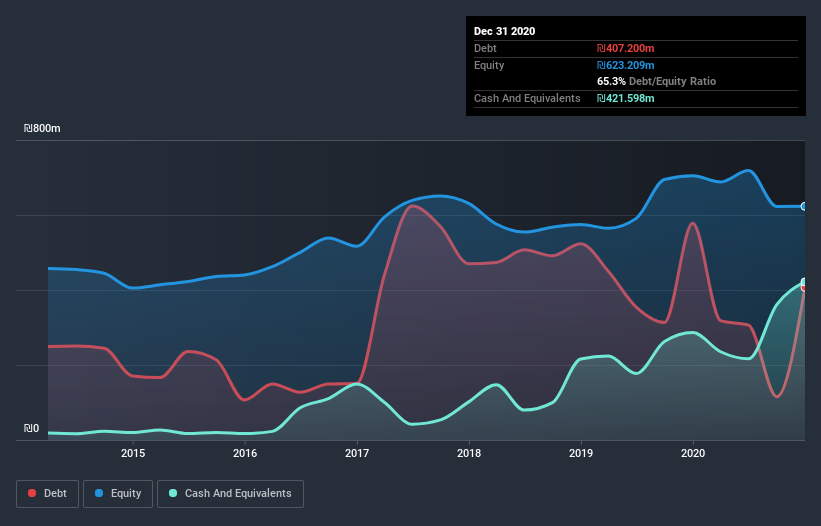Legendary fund manager Li Lu (who Charlie Munger backed) once said, 'The biggest investment risk is not the volatility of prices, but whether you will suffer a permanent loss of capital.' It's only natural to consider a company's balance sheet when you examine how risky it is, since debt is often involved when a business collapses. Importantly, Electra Consumer Products (1970) Ltd (TLV:ECP) does carry debt. But the more important question is: how much risk is that debt creating?
When Is Debt Dangerous?
Generally speaking, debt only becomes a real problem when a company can't easily pay it off, either by raising capital or with its own cash flow. Part and parcel of capitalism is the process of 'creative destruction' where failed businesses are mercilessly liquidated by their bankers. While that is not too common, we often do see indebted companies permanently diluting shareholders because lenders force them to raise capital at a distressed price. Of course, the upside of debt is that it often represents cheap capital, especially when it replaces dilution in a company with the ability to reinvest at high rates of return. The first step when considering a company's debt levels is to consider its cash and debt together.
View our latest analysis for Electra Consumer Products (1970)
What Is Electra Consumer Products (1970)'s Net Debt?
The image below, which you can click on for greater detail, shows that Electra Consumer Products (1970) had debt of ₪407.2m at the end of December 2020, a reduction from ₪577.9m over a year. But it also has ₪421.6m in cash to offset that, meaning it has ₪14.4m net cash.

A Look At Electra Consumer Products (1970)'s Liabilities
Zooming in on the latest balance sheet data, we can see that Electra Consumer Products (1970) had liabilities of ₪1.31b due within 12 months and liabilities of ₪192.5m due beyond that. On the other hand, it had cash of ₪421.6m and ₪534.6m worth of receivables due within a year. So its liabilities outweigh the sum of its cash and (near-term) receivables by ₪546.4m.
Since publicly traded Electra Consumer Products (1970) shares are worth a total of ₪3.03b, it seems unlikely that this level of liabilities would be a major threat. But there are sufficient liabilities that we would certainly recommend shareholders continue to monitor the balance sheet, going forward. Despite its noteworthy liabilities, Electra Consumer Products (1970) boasts net cash, so it's fair to say it does not have a heavy debt load!
It was also good to see that despite losing money on the EBIT line last year, Electra Consumer Products (1970) turned things around in the last 12 months, delivering and EBIT of ₪135m. When analysing debt levels, the balance sheet is the obvious place to start. But it is Electra Consumer Products (1970)'s earnings that will influence how the balance sheet holds up in the future. So when considering debt, it's definitely worth looking at the earnings trend. Click here for an interactive snapshot.
Finally, a company can only pay off debt with cold hard cash, not accounting profits. Electra Consumer Products (1970) may have net cash on the balance sheet, but it is still interesting to look at how well the business converts its earnings before interest and tax (EBIT) to free cash flow, because that will influence both its need for, and its capacity to manage debt. Happily for any shareholders, Electra Consumer Products (1970) actually produced more free cash flow than EBIT over the last year. That sort of strong cash conversion gets us as excited as the crowd when the beat drops at a Daft Punk concert.
Summing up
Although Electra Consumer Products (1970)'s balance sheet isn't particularly strong, due to the total liabilities, it is clearly positive to see that it has net cash of ₪14.4m. And it impressed us with free cash flow of ₪242m, being 179% of its EBIT. So is Electra Consumer Products (1970)'s debt a risk? It doesn't seem so to us. When analysing debt levels, the balance sheet is the obvious place to start. But ultimately, every company can contain risks that exist outside of the balance sheet. For example, we've discovered 3 warning signs for Electra Consumer Products (1970) that you should be aware of before investing here.
If you're interested in investing in businesses that can grow profits without the burden of debt, then check out this free list of growing businesses that have net cash on the balance sheet.
If you’re looking to trade Electra Consumer Products (1970), open an account with the lowest-cost* platform trusted by professionals, Interactive Brokers. Their clients from over 200 countries and territories trade stocks, options, futures, forex, bonds and funds worldwide from a single integrated account. Promoted
Valuation is complex, but we're here to simplify it.
Discover if Electra Consumer Products (1970) might be undervalued or overvalued with our detailed analysis, featuring fair value estimates, potential risks, dividends, insider trades, and its financial condition.
Access Free AnalysisThis article by Simply Wall St is general in nature. It does not constitute a recommendation to buy or sell any stock, and does not take account of your objectives, or your financial situation. We aim to bring you long-term focused analysis driven by fundamental data. Note that our analysis may not factor in the latest price-sensitive company announcements or qualitative material. Simply Wall St has no position in any stocks mentioned.
*Interactive Brokers Rated Lowest Cost Broker by StockBrokers.com Annual Online Review 2020
Have feedback on this article? Concerned about the content? Get in touch with us directly. Alternatively, email editorial-team (at) simplywallst.com.
About TASE:ECP
Electra Consumer Products (1970)
Manufactures, imports, exports, distributes, sells, and services for various consumer electrical products in Israel.
Acceptable track record with low risk.
Market Insights
Community Narratives



